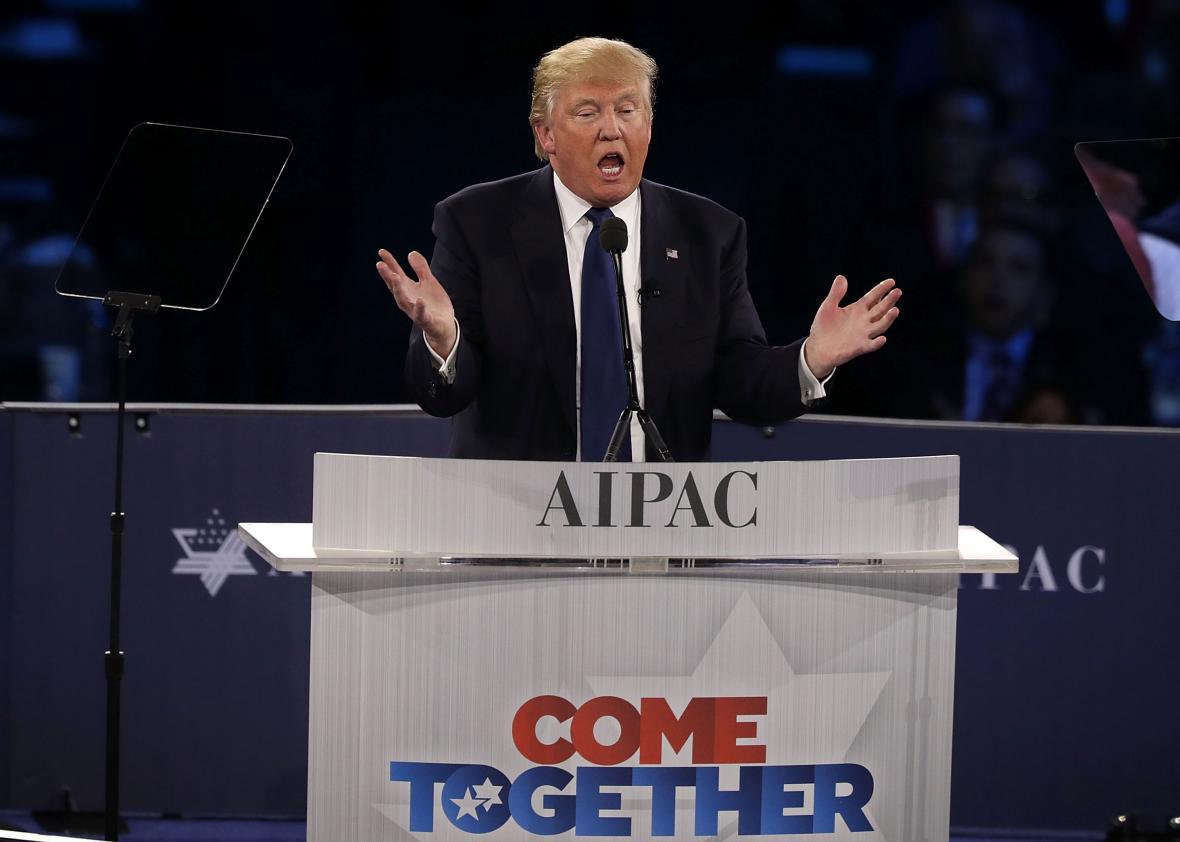“I didn’t come here to pander to you about Israel,” Donald Trump said during a surprisingly stilted speech to AIPAC Monday night. “I came here to speak to you about where I stand on the future of American relations with our strategic ally, our unbreakable friendship, and our cultural brother, the only democracy in the Middle East, the state of Israel.” Trump’s speech thus functioned as both a conscious branding of himself as someone uniquely suited to rise above politics as usual, and a blueprint of actual policies, such as they are, that in no way depart from politics as usual.
This isn’t the first time that, on the subject of Israel and the Palestinians, Trump has combined both a critique of political pandering and actual political pandering. For months, Trump has been saying that he would remain neutral in brokering a dialogue between Israelis and the Palestinians, drawing criticism from his Republican rivals, and even, in muted form, from Hillary Clinton in her own speech to AIPAC on Monday. But when you scratch the surface of what Trump has said about Israel—on the campaign trail and during the AIPAC speech—there is nothing new or fresh about it. Trump has blamed Palestinians for the state of conflict in Israel and the West Bank, and stigmatized Islam repeatedly. He has offered nothing in the way of creative policies or new strategies.
It all fits with the typical Trumpian pattern. He has blasted certain tax breaks for the wealthy, earning himself positive headlines, and then gone on to propose the most regressive tax cut of any of the Republican candidates. He has stated that people shouldn’t die in the streets from a lack of health care, and then gone on to propose abolishing Obamacare and replacing it with, er, nobody knows.
Most of Trump’s speech on Monday was filled with typical AIPAC boilerplate: bashing Iran, castigating the Iran deal, scolding the United Nations. (Trump got some applause for several of these lines, although the crowd appeared to laugh at him when he bragged about how much time he had spent studying the Iran deal.) He even called for moving the American embassy to Jerusalem, something that several candidates have proposed, but no American president—Democrat or Republican—has ever dared to actually do. (The embassy is currently in Tel Aviv.) When it came to peace negotiations between the two sides, Trump put the onus on the Palestinians, even seeming to go beyond where the hawkish crowd was willing to go when he called for “confronting” Palestinian behavior.
There was a moment on Monday, before the speech, when it seemed as if Trump might depart from, yes, typical pandering for more than a split second. After being asked at a press conference whether Israel was one of the countries that he thought could pay their own way and didn’t require foreign aid (a classic Trump theme), the candidate replied, “There are many countries that can pay, and they can pay big-league.” Whatever that meant—and who really knows?—Trump, later in the day, returned to the issue, saying Israel helps us “greatly.” The hour or two of uncertainty was over.
Trump has become successful, in part, by breaking with GOP orthodoxy on subjects like trade. But his other supposedly bold stands have just been rhetorical feints at reasonableness. Trump may be uniquely scary in his hatred of the press, the divisiveness of his rhetoric, and the extent of his bigotry. But on Israel, as on so many other subjects, he sounds awfully similar to Ted Cruz and John Kasich. And Hillary Clinton.
